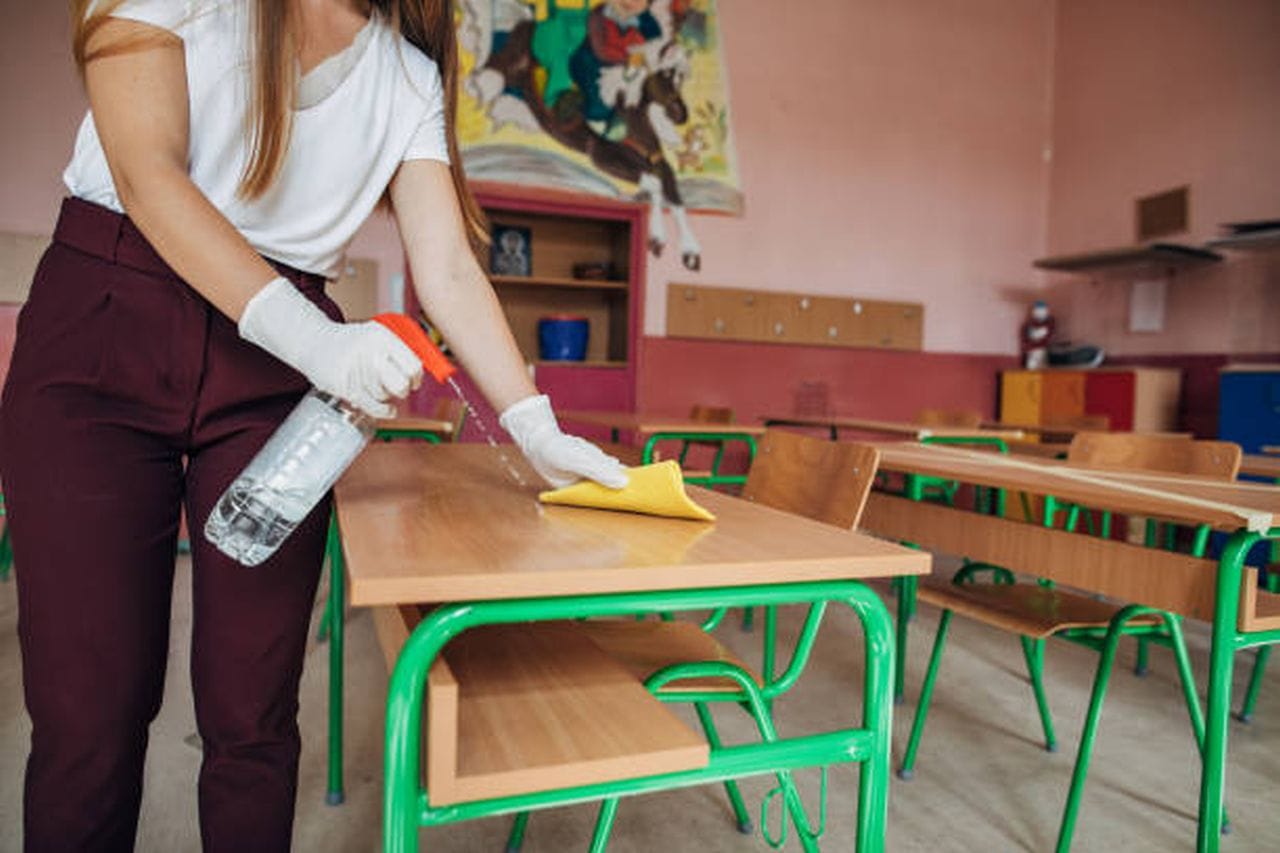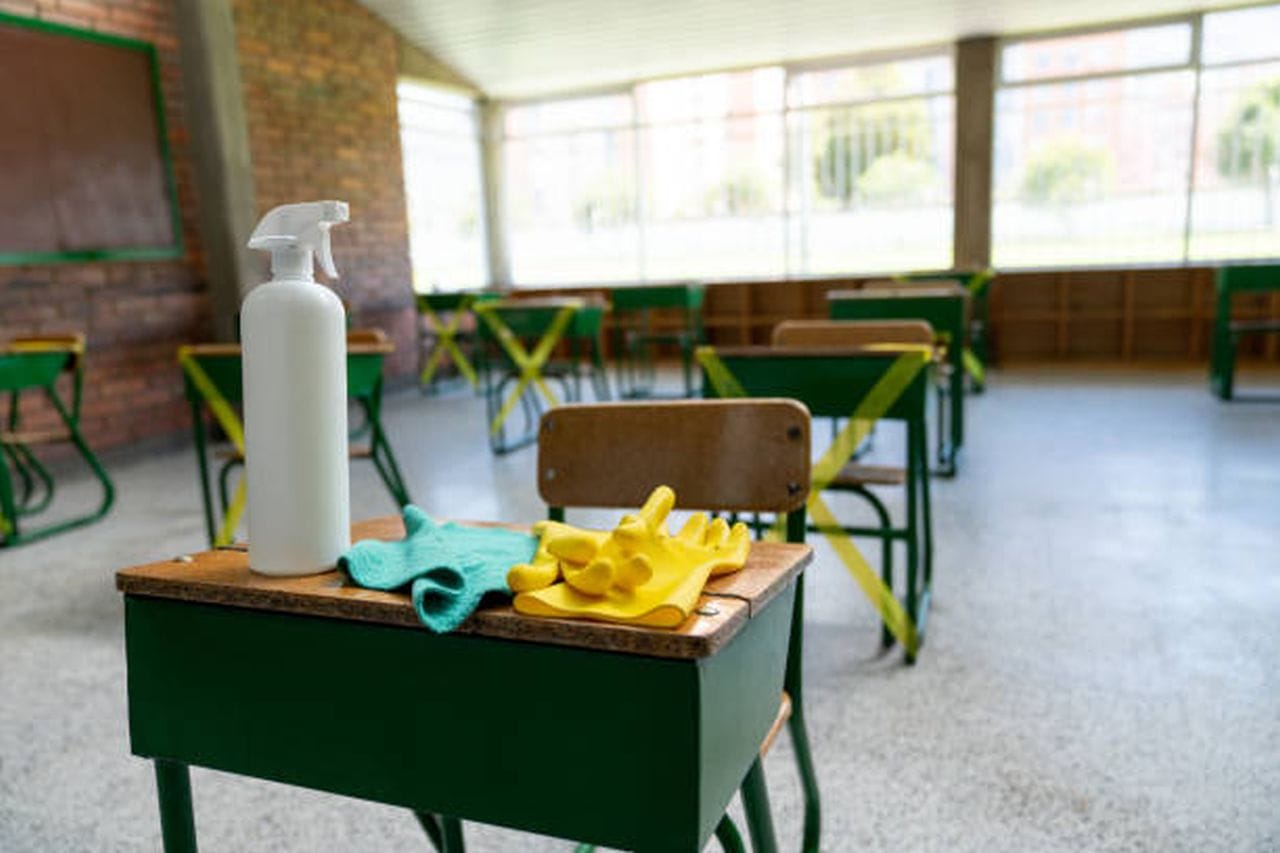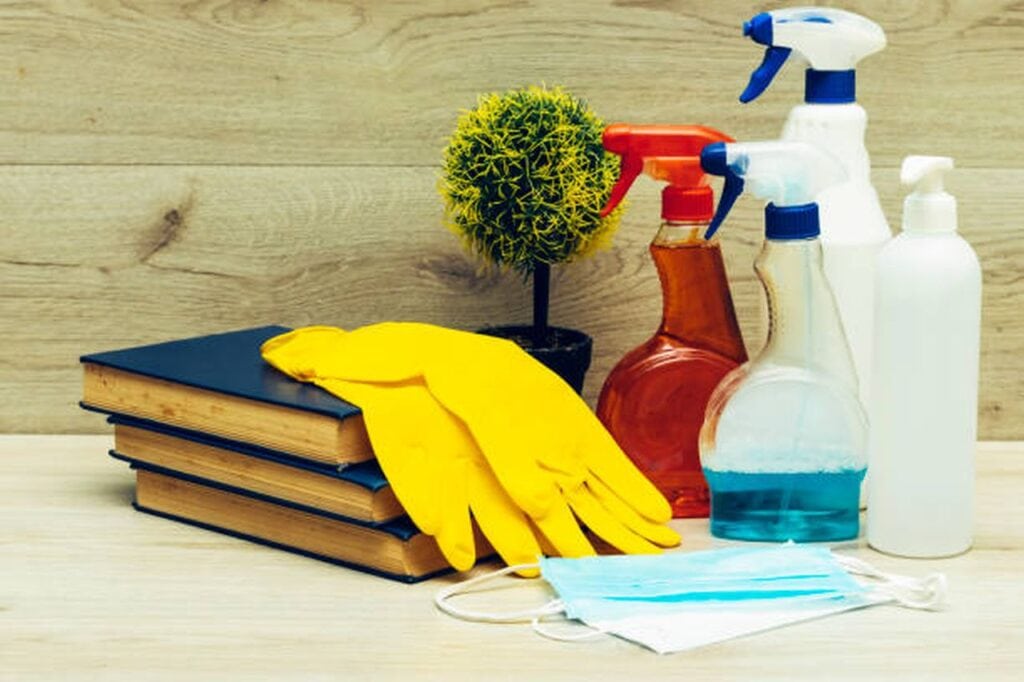Did you realise that even everyday household cleaning products might pose a threat to your health? Cleaning chemicals is unfortunately a reality that many individuals must face on a regular basis.
This is especially true of academic institutions like colleges and universities. One cannot ignore the significance of green cleaning in educational institutions. However, not everyone agrees that it's worth it. Let's examine this procedure in greater detail.
What is Green Cleaning?
Green cleaning, also known as ecological cleaning or sustainable cleaning, is an approach to cleaning that uses non-hazardous materials and methods to lessen its negative effects on the environment and on people's health.
Green cleaning relies on non-toxic products that are safe for both humans and the environment, such as vinegar, baking soda, lemon juice, and essential oils. Instead of using toxic chemicals and artificial scents, green cleaning products are non-toxic and environmentally friendly.
By promoting the use of concentrated cleaning solutions and supporting the recycling of containers, this method also aims to reduce waste and promote sustainability.
The principles of green cleaning centre on conserving resources like water and electricity, conducting waste management and recycling in an eco-friendly manner, and using environmentally friendly cleaning products and methods.
This trend is growing as people realise the benefits of reducing their carbon footprint and adopting a healthier, more sustainable lifestyle.
Why Is Green Cleaning Important?
There are several compelling arguments in favour of green cleaning, including its contribution to long-term sustainability, the protection of human health, and an improvement in quality of life.
One major benefit is that air and water pollution are both greatly reduced as a result of the decreased use of dangerous chemicals and pollutants. Many common household cleaners contain toxic chemicals that are bad for both aquatic life and soil quality in the long run.
Second, because it minimises contact with chemicals, green cleaning helps keep people healthy. Using conventional cleaning products often results in respiratory problems, allergies, skin irritation, and even more serious health concerns due to the presence of volatile organic compounds (VOCs) and other pollutants. Instead of using synthetic chemicals, "green" cleaners stick to harmless substances found in nature.
Traditional cleaning products have a large carbon footprint due to their creation, use, and disposal. By using green cleaning products and methods, homes and businesses may lessen their impact on the environment, save money on utility bills, and do their part to slow global warming.
Sustainable green cleaning practises, such as reusing containers and encouraging proper waste disposal, are in line with national campaigns to reduce plastic waste and encourage a circular economy.
By using safer, more environmentally friendly alternatives to conventional cleaning products and practises, green cleaning is crucial because it is in line with the principles of sustainability, prioritises human well-being, and helps alleviate environmental harm.

How Does Green Cleaning Work?
The term "green cleaning" refers to a method of maintaining a school that is mindful of the environment by emphasising the use of non-hazardous materials and procedures.
This approach to cleaning schools involves a number of concepts and practises meant to lessen the toll that cleaning procedures take on students' health and the environment.
The core of eco-friendly cleaning is reusing or recycling cleaning supplies rather than buying new ones. Ingredients including baking soda, vinegar, lemon juice, aromatic oils, and plant-based surfactants are frequently used in such preparations.
Green cleaning products, as opposed to their conventional counterparts, do not include any of the noxious chemicals or synthetic perfumes that have been linked to respiratory problems, skin irritations, and other health problems.
Natural Cleaning Agents
Green cleaning emphasises the utilisation of natural ingredients for cleaning. For instance, baking soda is a versatile cleaner that can scrub surfaces, neutralise odors, and act as a gentle abrasive.
Vinegar is effective in removing stains and eliminating bacteria. Lemon juice, owing to its acidic properties, can dissolve mineral deposits and stains. Essential oils not only add a pleasant aroma but also possess antimicrobial properties.
Non-Toxic Cleaning Solutions
Toxic chemicals, often present in conventional cleaning agents, can have detrimental effects on the health of students, faculty, and staff. Green cleaning focuses on the use of non-toxic solutions, ensuring a safe and healthy environment. Students and staff are not exposed to harmful fumes or residues that can potentially cause allergies, respiratory issues, or other health problems.
Environmentally Friendly Practices
Green cleaning practices extend beyond the choice of cleaning products. They encompass sustainable and environmentally conscious actions, such as reducing waste through proper dispensing systems, recycling containers, and reusing or refilling cleaning product bottles. Additionally, schools may opt for energy-efficient cleaning equipment to minimise the carbon footprint.
Waste Reduction and Recycling
Implementing waste reduction and recycling programs within school cleaning operations is crucial for sustainable practices. Using concentrated cleaning solutions helps minimise packaging waste. Recycling paper towels and using refillable dispensers for cleaning agents contribute to waste reduction efforts.
Energy and Water Efficiency
Green cleaning involves utilising energy-efficient appliances and adopting water-saving practices. This includes using cleaning equipment that requires less water or opting for cold water cleaning methods to reduce energy consumption.
Proper Disposal and Recycling of Containers
Encouraging responsible disposal and recycling of cleaning product containers is an integral part of green cleaning. Providing designated bins for recycling and educating students and staff on proper disposal methods helps in achieving a more sustainable approach.
Training and Education
Proper training and education are fundamental in implementing green cleaning practices effectively. Schools conduct training programs to educate custodial staff on the proper use of green cleaning products and the importance of eco-friendly cleaning procedures.
Schools make a positive impact on the health and sustainability of their surrounding communities when they adopt green cleaning practises. In addition, it teaches students to be conscientious of their impact on the planet and encourages them to adopt sustainable practises in their daily lives, not only at school.
How Do I Choose a Green Cleaning Service?
When looking for a cleaning service, it's important to find one that uses methods that are safe for workers and the environment. When looking for a green cleaning service, it's important to make sure they take into account your specific environmental and health concerns.
- Certifications and Credentials: Look for certifications and accreditations from recognised organisations in the sustainability and cleaning industry. Certifications like Green Seal, EPA Safer Choice, or certifications from local environmental agencies indicate a commitment to adhering to specific environmental and health standards.
- Use of Environmentally Friendly Products: Ensure the company utilises cleaning products that are eco-friendly, biodegradable, and free from harmful chemicals. Green cleaning products should have a minimal impact on the environment and human health while still being effective in cleaning and disinfecting.
- Transparency in Ingredients: A reputable green cleaning company will provide transparency regarding the ingredients in their cleaning products. They should readily disclose a complete list of ingredients and any potential health or environmental risks associated with them.
- Efficient Cleaning Processes: Evaluate the company's cleaning processes to ensure they prioritise efficiency and waste reduction. Effective waste management, optimised resource usage, and energy-efficient cleaning practices are indicators of an environmentally conscious approach.
- Waste Reduction and Recycling Initiatives: Inquire about the company's waste reduction strategies and recycling initiatives. Green cleaning companies should have proper waste management protocols in place, including recycling programs for bottles, containers, and other materials.
- Proper Training and Education: Ensure that the cleaning company provides adequate training to their staff on green cleaning practices. The cleaning team should understand the significance of eco-friendly cleaning methods and how to use environmentally friendly products effectively.
- Health and Safety Measures: Verify that the green cleaning company prioritises the health and safety of both their employees and the occupants of the spaces they clean. They should adhere to safety protocols, proper ventilation, and ensure that the cleaning products used are not harmful to human health.
- Customised Cleaning Plans: Look for a company that tailors their cleaning plans to meet the specific needs and preferences of your facility. A personalised approach demonstrates a commitment to providing effective cleaning solutions while considering the unique aspects of your environment.
- Track Record and Reviews: Research the company's reputation through reviews, testimonials, or case studies. A proven track record of successful green cleaning projects and satisfied clients is a positive indicator of their competence and reliability.
- Cost-Effectiveness and Value: While green cleaning may have slightly higher initial costs due to the use of eco-friendly products, evaluate the overall cost-effectiveness and value. Consider the long-term benefits, such as potential cost savings, improved indoor air quality, and a healthier environment.
- Sustainability Practices Beyond Cleaning: Evaluate if the company implements sustainability practices in other aspects of their business, such as energy-efficient transportation, reducing plastic waste, or supporting community sustainability initiatives.
When looking for a green cleaning service, it's important to evaluate their policies and procedures in terms of environmental friendliness, worker health and safety, openness, and compatibility with your own sustainability objectives. If you do your homework throughout the selection process, you might find a business that has the same values as you and helps to create a better place to live or work.

Conclusion
Green cleaning is a way of sustainable cleaning that avoids the use of toxic chemicals and other potentially harmful products. Vinegar, baking soda, lemon juice, and essential oils are just some of the non-toxic materials it uses. Green cleaning advocates for recycling, waste reduction, and sustainability by using concentrated cleaning solutions.
Sustainable cleaning practises that are also kind to human health and well-being are crucial for the future of our planet. As a result, less toxic chemicals and other pollutants are released into the air and water. Cleaning with green products reduces one's exposure to harmful chemicals, protecting one from asthma attacks, allergies, and skin irritation.
Green cleaning is effective because it reduces waste by reusing or recycling cleaning materials, and it relies on non-toxic cleaning chemicals such as baking soda, vinegar, lemon juice, fragrant oils, and plant-based surfactants. By taking these measures, we can reduce the likelihood that our kids, educators, and staff will have health conditions like asthma and allergies.
Green cleaning entails eco-friendly practises including recycling, reusing materials, and waste minimisation. By implementing these measures, schools can reduce their environmental effect and benefit the communities in which they are located. Green cleaning solutions and environmentally friendly cleaning practises are becoming increasingly popular, and schools should give sufficient training and information on their use.
Content Summary
- Did you realise that even everyday household cleaning products might pose a threat to your health?
- Cleaning chemicals is unfortunately a reality that many individuals must face on a regular basis.
- This is especially true of academic institutions like colleges and universities.
- One cannot ignore the significance of green cleaning in educational institutions.
- However, not everyone agrees that it's worth it.
- Green cleaning, also known as ecological cleaning or sustainable cleaning, is an approach to cleaning that uses non-hazardous materials and methods to lessen its negative effects on the environment and on people's health.
- Green cleaning relies on non-toxic products that are safe for both humans and the environment, such as vinegar, baking soda, lemon juice, and essential oils.
- Instead of using toxic chemicals and artificial scents, green cleaning products are non-toxic and environmentally friendly.
- By promoting the use of concentrated cleaning solutions and supporting the recycling of containers, this method also aims to reduce waste and promote sustainability.
- The principles of green cleaning centre on conserving resources like water and electricity, conducting waste management and recycling in an eco-friendly manner, and using environmentally friendly cleaning products and methods.
- There are several compelling arguments in favour of green cleaning, including its contribution to long-term sustainability, the protection of human health, and an improvement in quality of life.
- Second, because it minimises contact with chemicals, green cleaning helps keep people healthy.
- Traditional cleaning products have a large carbon footprint due to their creation, use, and disposal.
- By using green cleaning products and methods, homes and businesses may lessen their impact on the environment, save money on utility bills, and do their part to slow global warming.
- Sustainable green cleaning practises, such as reusing containers and encouraging proper waste disposal, are in line with national campaigns to reduce plastic waste and encourage a circular economy.
- By using safer, more environmentally friendly alternatives to conventional cleaning products and practises, green cleaning is crucial because it is in line with the principles of sustainability, prioritises human well-being, and helps alleviate environmental harm.
- The term "green cleaning" refers to a method of maintaining a school that is mindful of the environment by emphasising the use of non-hazardous materials and procedures.
- This approach to cleaning schools involves a number of concepts and practises meant to lessen the toll that cleaning procedures take on students' health and the environment.
- The core of eco-friendly cleaning is reusing or recycling cleaning supplies rather than buying new ones.
- Green cleaning emphasises the utilisation of natural ingredients for cleaning.
- Toxic chemicals, often present in conventional cleaning agents, can have detrimental effects on the health of students, faculty, and staff.
- Green cleaning focuses on the use of non-toxic solutions, ensuring a safe and healthy environment.
- Green cleaning practices extend beyond the choice of cleaning products.
- They encompass sustainable and environmentally conscious actions, such as reducing waste through proper dispensing systems, recycling containers, and reusing or refilling cleaning product bottles.
- Additionally, schools may opt for energy-efficient cleaning equipment to minimise the carbon footprint.
- Implementing waste reduction and recycling programs within school cleaning operations is crucial for sustainable practices.
- Encouraging responsible disposal and recycling of cleaning product containers is an integral part of green cleaning.
- Providing designated bins for recycling and educating students and staff on proper disposal methods helps in achieving a more sustainable approach.
- Proper training and education are fundamental in implementing green cleaning practices effectively.
- Schools conduct training programs to educate custodial staff on the proper use of green cleaning products and the importance of eco-friendly cleaning procedures.
- Schools make a positive impact on the health and sustainability of their surrounding communities when they adopt green cleaning practises.
- In addition, it teaches students to be conscientious of their impact on the planet and encourages them to adopt sustainable practises in their daily lives, not only at school.
- When looking for a cleaning service, it's important to find one that uses methods that are safe for workers and the environment.
- When looking for a green cleaning service, it's important to make sure they take into account your specific environmental and health concerns.
- Look for certifications and accreditations from recognised organisations in the sustainability and cleaning industry.
- Ensure the company utilises cleaning products that are eco-friendly, biodegradable, and free from harmful chemicals.
- A reputable green cleaning company will provide transparency regarding the ingredients in their cleaning products.
- Evaluate the company's cleaning processes to ensure they prioritise efficiency and waste reduction.
- Effective waste management, optimised resource usage, and energy-efficient cleaning practices are indicators of an environmentally conscious approach.
- Inquire about the company's waste reduction strategies and recycling initiatives.
- Ensure that the cleaning company provides adequate training to their staff on green cleaning practices.
- Verify that the green cleaning company prioritises the health and safety of both their employees and the occupants of the spaces they clean.
- A proven track record of successful green cleaning projects and satisfied clients is a positive indicator of their competence and reliability.
- While green cleaning may have slightly higher initial costs due to the use of eco-friendly products, evaluate the overall cost-effectiveness and value.
- When looking for a green cleaning service, it's important to evaluate their policies and procedures in terms of environmental friendliness, worker health and safety, openness, and compatibility with your own sustainability objectives.
Frequently Asked Questions About Cleaning Services
Cleaning services normally include dusting, vacuuming, floor washing, and bathroom and kitchen disinfection. The firm and package you choose may include window washing, carpet shampooing, and furniture dusting in a deep cleaning.
A reputable cleaning service will only use eco-friendly cleaning products. If your family or pets have sensitivity to certain cleaning agents, tell the cleaning personnel.
Trustworthy cleaners are what our customers are seeking for. Remember that they are letting you inside their house when they themselves are not there. In addition to a spotless house, they need impeccable service from skilled cleaners.
Most professional cleaning businesses provide customisable plans. The cleaning service provider can customise services to your needs. Customisation is usually available for one-time thorough cleanings, weekly cleanings, and event cleanings.
Being at home during the cleaning process is prefered, but not required. A lot of people just let the cleaning service in and go about their day after handing them the keys and instructions. Specialist and trustworthy, reliable cleaning services are what you need. Attending the cleaning in person can help ease your anxiety.
